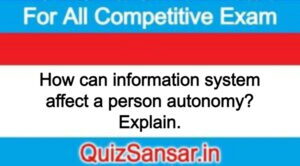
How can information system affect a person autonomy? Explain.
How can information system affect a person autonomy? Explain.
Ans.
Autonomy is a concept found in moral, political, and bioethical philosophy. Within these contexts, it refers to the capacity of a rational individual to make an informed, un-coerced decision. In moral and political philosophy, autonomy is often used as the basis for determining moral responsibility for one’s actions. One of the best known philosophical theories of autonomy was developed by Kant. In medicine, respect for the autonomy of patients is an important goal of deontology, though it can conflict with a competing ethical principle, namely beneficence. Autonomy is also used to refer to the self-government of the people.
The manager has a position of responsibility and accountability for the business results. His management role expands beyond his management function. He is a strategist and a long-term planner. He is a person with a foresight, an analytical ability and is expected to use these abilities in the functions of top management. The MIS provides information in a structured or unstructured format for him to react. The MIS caters to his constant changing needs of information. The user of the MIS is expected to be a rational person and the design of the MIS is based on this assumption.
However, in reality the impact created on individuals by MIS is difficult to explain. The nature of the impact in a few cases is negative.
However, this negative impact can be handled with proper training and counseling.
It is observed that at lower level, there is a sense of insecurity. As the MIS takes away the drudgery of search, collection, writing and reporting the data, the work vacuum, so created is not easily filled, thus creating a sense of insecurity. To some extent the importance of the person is also lost, giving rise to a fear of non-recognition in the organization.
Autonomy is a Greek word which means “self” + nomos, “law” which means one who gives oneself his/her own law. Person autonomy means to be a law to oneself, autonomous agents are self-governing agents.
The emergence of the information systems has the potential to increase individual autonomy in various ways like:
(1) It increases the range and diversity of things that individuals can do for and by themselves.
It does this by lifting, for one important domain of life; some of the central material constraints on what individuals can do that typified the industrial information systems. The majority of materials, tools, and platforms necessary for effective action in the information environment are in the hands of most individuals in advanced economies.
(2) The networked information systems provide non-proprietary alternative sources of communications capacity and information, alongside the proprietary platforms of mediated communications.
This decreases the extent to which individuals are subject to being acted upon by the owners of the facilities on which they depend for communications. The construction of consumers as passive objects of manipulation that typified television culture has not disappeared overnight, but it is losing its dominance in the information environment.
(3) Information systems qualitatively increase the range and diversity of information available to individuals.
It does so by enabling sources. commercial and non-commercial, mainstream and fringe, domestic or foreign, to produce information and communicate with anyone.
This diversity radically changes the universe of options that individuals can consider as open for them to pursue. It provides them a richer basis to form critical judgments about how they could live their lives, and, through this opportunity for critical reflection, why they should value the life they choose.






